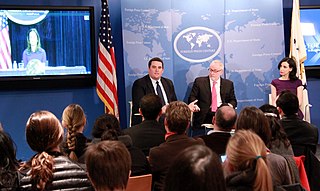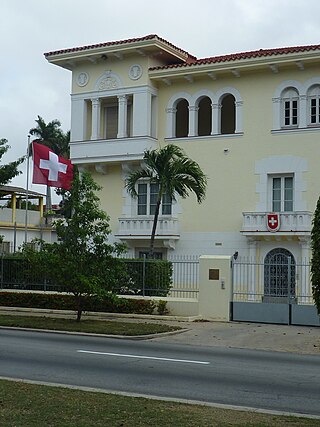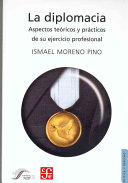Diplomatic capital refers to the trust, goodwill, and influence which a diplomat, or a state represented by its diplomats, has within international diplomacy. [1] According to political scientist Rebecca Adler-Nissen, diplomatic capital is a kind of currency that can be traded in diplomatic negotiations and that is increased when positive ″social competences, reputation and personal authority" are portrayed. [2]
Diplomatic capital can be accumulated by economic cooperation [3] and by contributions to the solution of international crises, [4] It is strengthened when in other countries the sentiment prevails that the interests of a state or the diplomats representing it are aligned with their own interests. Conversely, it can be squandered when a country engages in a confrontation, an armed conflict or a war, if that is perceived as unjust or at odds with the interests of others. [5] [6]
Diplomatic capital is also linked to the extent of enforcement of human rights. [7]

A diplomatic mission or foreign mission is a group of people from a state or organization present in another state to represent the sending state or organization officially in the receiving or host state. In practice, the phrase usually denotes an embassy or high commission, which is the main office of a country's diplomatic representatives to another country; it is usually, but not necessarily, based in the receiving state's capital city. Consulates, on the other hand, are smaller diplomatic missions that are normally located in major cities of the receiving state. As well as being a diplomatic mission to the country in which it is situated, an embassy may also be a nonresident permanent mission to one or more other countries.

A diplomat is a person appointed by a state or an intergovernmental institution such as the United Nations or the European Union to conduct diplomacy with one or more other states or international organizations.

International Relations (IR) are the interactions among sovereign states. The scientific study of those interactions is called international studies, international politics, or international affairs. In a broader sense, it concerns all activities among states—such as war, diplomacy, trade, and foreign policy—as well as relations with and among other international actors, such as intergovernmental organizations (IGOs), international nongovernmental organizations (INGOs), international legal bodies, and multinational corporations (MNCs). There are several schools of thought within IR, of which the most prominent are realism, liberalism, and constructivism.

Digital diplomacy, also referred to as Digiplomacy and eDiplomacy, has been defined as the use of the Internet and new information communication technologies to help achieve diplomatic objectives. However, other definitions have also been proposed. The definition focuses on the interplay between internet and diplomacy, ranging from Internet driven-changes in the environment in which diplomacy is conducted to the emergence of new topics on diplomatic agendas such as cybersecurity, privacy and more, along with the use of internet tools to practice diplomacy.

A protecting power is a country that represents another sovereign state in a country where it lacks its own diplomatic representation. It is common for protecting powers to be appointed when two countries break off diplomatic relations with each other. The protecting power is responsible for looking after the protected power's diplomatic property and citizens in the hosting state. If diplomatic relations were broken by the outbreak of war, the protecting power will also inquire into the welfare of prisoners of war and look after the interests of civilians in enemy-occupied territory.

The Ministry of Foreign Affairs is the governmental body responsible for conducting foreign relations of the Republic of Turkey. The Ministry is responsible for Turkey's diplomatic missions abroad and for the promotion of Turkish culture, as well as for implementing the country's foreign policy in accordance with its national interests. Established on 2 May 1920, its primary duties are administering diplomatic missions, negotiating international treaties and agreements, and representing the Republic of Turkey at the United Nations. The ministry is headquartered in the Turkish capital of Ankara and counts on more than 200 missions as embassies, permanent representation offices and consulates general, abroad. As of 2021, the Ministry of Foreign Affairs maintains 235 diplomatic posts worldwide. The current Minister of Foreign Affairs is Hakan Fidan, who has held the position since 3 June 2023.
Guerrilla diplomacy is a method of diplomacy that is identified as an alternative approach to the established common frameworks of international relations, being primarily articulated by Daryl Copeland in response to the foreign policy outcomes of the War on Terror. In a sense, the responses to the major events of the late 20th century and the early 21st century which has brought major changes to the International Order is identified as in need of a new paradigm of diplomatic thinking in order to adapt to the needs of modern diplomacy.

Harold Henry Saunders served as the United States Assistant Secretary of State for Intelligence and Research between 1975 and 1978 and United States Assistant Secretary of State for Near East Affairs between 1978 and 1981. Saunders was a key participant in the Camp David Accords, helped negotiate the Iran Hostage Crisis, and developed the sustained dialogue model for resolving conflicts Saunders later launched the Sustained Dialogue Institute, which uses the sustained dialogue model to address racial and other issues in the United States and abroad.
Joseon diplomacy was the foreign policy of the Joseon dynasty of Korea from 1392 through 1910; and its theoretical and functional foundations were rooted in Neo-Confucian scholar-bureaucrats, institutions and philosophy.

A chancery is the principal office that houses a diplomatic mission or an embassy. This often includes the associated building and the site. The building can house one or several different nations' missions. The term derives from chancery or chancellery, the office of a chancellor. Some nations title the head of foreign affairs a chancellor, and 'chancery' eventually became a common referent to the main building of an embassy.
The Ministry of Foreign Affairs of the Republic of Slovenia is an executive department of the Government of Slovenia responsible for relations with other countries and international organisations, monitoring of the international political and economic situation, and strengthening of Slovenia's relations with other countries and international organisations.
The Racial Equality Proposal was an amendment to the Treaty of Versailles that was considered at the 1919 Paris Peace Conference. Proposed by Japan, it was never intended to have any universal implications, but one was attached to it anyway, which caused its controversy. Japanese Foreign Minister Uchida Kōsai stated in June 1919 that the proposal was intended not to demand the racial equality of all coloured peoples but only that of members of the League of Nations.

Diplomacy comprises spoken or written communication by representatives of states intended to influence events in the international system.
Science diplomacy is the use of scientific collaborations among nations to address common problems and to build constructive international partnerships. Science diplomacy is a form of new diplomacy and has become an umbrella term to describe a number of formal or informal technical, research-based, academic or engineering exchanges, within the general field of international relations and the emerging field of global policy making.

Community of common destiny for mankind, officially translated as community with a shared future for mankind or human community with a shared future, is a political slogan used by the Chinese Communist Party (CCP) to describe a stated foreign-policy goal of the People's Republic of China. The phrase was first used by former CCP General Secretary Hu Jintao and has been frequently cited by current General Secretary Xi Jinping. As the term's usage in English has increased, "shared future" has become more frequently used than "common destiny," as the latter arguably implies a predetermined path. The phrase was included in the CCP Constitution in 1997, and the preamble of the Constitution of the People's Republic of China when the Constitution was amended in 2018.

In political science, triangular diplomacy is a foreign policy of the United States, developed during the Vietnam War (1955–1975) by Henry Kissinger, as a means to manage relations between the contesting communist powers, the Soviet Union and China. Connecting heavily with the correlating policy of linkage, the policy was intended to exploit the ongoing rivalry between the two Communist powers, as a means to strengthen American hegemony and diplomatic interest.
Energy diplomacy is a form of diplomacy, and a subfield of international relations. It is closely related to its principal, foreign policy, and to overall national security, specifically energy security. Energy diplomacy began in the first half of the twentieth century and emerged as a term during the second oil crisis as a means of describing OPEC's actions. It has since mainly focused on the securitization of energy supplies, primarily fossil fuels, but also nuclear energy and increasingly sustainable energy, on a country or bloc basis.

Aaron (Aharon) S. Klieman was an American-born Israeli historian of international relations who developed the field of international affairs in Israel and abroad. Klieman researched a wide variety of fields in political science including history, arms sales, and geopolitics. He was the Dr. Nahum Goldmann Chair in Diplomacy and lecturer on international relations in the Department of Political Science at Tel-Aviv University, and was the founding director of the Abba Eban Graduate Program in Diplomatic Studies. A native of Chicago, Illinois, his PhD is from The Johns Hopkins University School of Advanced International Studies, with an M.A. from the School of International Affairs at Columbia University in Middle Eastern studies.

Diplomacy: Theoretical and Practical Aspects is a 1996 book written by Ismael Moreno Pino, a former ambassador and deputy foreign minister of Mexico, who was active in promoting nuclear disarmament during the Cold War.
Data diplomacy can be defined in two different ways: use of data as a means and tool to conduct national diplomacy, or the use of diplomatic actions and skills of various stakeholders to enable and facilitate data access, understanding, and use. Data can help and influence many aspects of the diplomatic process, such as information gathering, negotiations, consular services, humanitarian response and foreign policy development. The second kind of data diplomacy challenges traditional models of diplomacy and can be conducted without tracks and diplomats. Drivers of change in diplomacy are also emerging from industry, academia and directly from the public.